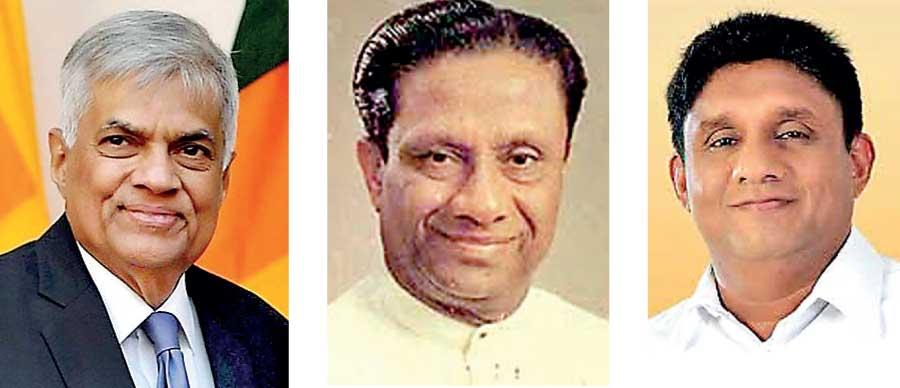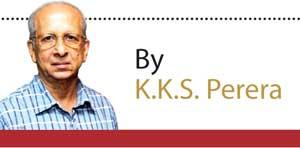Reply To:
Name - Reply Comment

Reading the well-written ‘rational scrutiny’ by a learned academic (Aug.25, 2020) in response to the Daily Mirror columnist’s “Opposition in the Oblivion: How and why it happened”- (Aug.11, 2020) prompted me to pen a few relevant ideas on the current political climate. SLPP was not formed in 2015, but in the late 2016, and SJB polled only 23.9% of total votes, and not 27% as mentioned in the ‘scrutiny’. Yes, as mentioned by the learned academic,  it is a major paradigm shift, but in contrast to his view, for the first time in the electoral history; the main opposition party [both added together] recorded the lowest percentage of votes. (UNP’s 3% plus SJB’s 23.9 the total remains less than 27).
it is a major paradigm shift, but in contrast to his view, for the first time in the electoral history; the main opposition party [both added together] recorded the lowest percentage of votes. (UNP’s 3% plus SJB’s 23.9 the total remains less than 27).
The writer’s unique experimental approach in researching in to voter’s pulse through Tuk Tuk drivers and sweep ticket vendors during the campaign trail of 2020 General elections paid high dividends. These two categories of men and their customers are in the habit of discussing what’s going around while they travel to their destinations or checking the results of tickets of previous draws. The government’s efficient handling of the COVID-19 pandemic permitted them to encroach in to the North and East minority vote base, most believed.
Vast majority of middle and lower middle class folk not only doubted SJB leader’s promise of Rs 20,000 dole but did not hesitate to view the election pledge with disgust, that they thought it was a calculated move to deceive the voter. Going beyond Sirimavo’s“Handen hal-1970” or JR’s“Eta ata-1977” days, the pledges made by the winning side— they even concluded the Rs.20,000 promise as the worst cunning trick attempted to swindle them by someone who correctly guessed the final outcome of the August 5 result; hence it became a question of man’s credibility. They even rated Ranil, who with only a minimal chance of winning, did promise only half the amount.
Beating SLPP in Colombo Central
The Marxist/UNP shared constituency of 1950-60s was subsequently converted to a UNP stronghold by Sajith’s mercurial and dynamic father who at the age of 16 launched the Sucharitha [high morals] movement in the heart of electorate and ran a night school to teach virtues of life to misguided Keselwatte youth. Later he ventured into learning labour movement/trade unionism and basics of local government politics under veteran labour leader AE Gunasinghe. His guru and mentor who could not meet the challengers paused by young Marxists who invaded the trade union movement in 1940s, and was compelled to seek refuge under the banner of Senanayakes, taking with him young Premadasa.Colombo Central/North became a Red-fortresses in late 1940s/1950s under NM Perera/Pieter Keunaman who successfully grabbed the Municipality in the early 50s for a short stint. With Keunaman defeating Gunasinghe in Colombo-Central in 1952, R. Premadasa the futurist realized that he had to switch from Sucharitha to a different approach, and by late 1950s and early 60s in total opposition to Sucharitha morals he spoke to the 42% shanty-dweller voter base in a language they better understood turning the tide in his and his party’s favour. Thanks to Sajith’s father, since then the Colombo’s five seats remained loyal to the ‘winning UNP’ irrespective of individuals. Sajith, being a Premadasa has every right to claim thumping majorities in the locality, more than his former leaders JR [in 1960] and Ranil [in 1994] who rushed there abandoning Kelaniya and Biyagama respectively for fear of Colombo suburb voter and sought refuge in the safe paradise. JR was elected to the State Council at Kelaniya by-election in 1943, when he used an anti-Christian campaign against the national hero E. W. Perera, where he continued till 1956 to be beaten by Cousin RG Senanayake. Ranil who entered parliament from Biyagama continued for 17 years, but deserted it in 1994 looking for greener pastures. Sajith only followed the example set by former leaders in abandoning the fast deteriorating support base in Hambantota.
As mentioned by the university Don, Sajith started his political journey faring exceptionally well in the Deep South in 2000 and 2001. But he performed poorly three years later at 2004 Parliamentary election: the graph on his report card depicted a downward trend with the entry of the crown prince of Giruwapattu Kingdom in 2010, for Sajith to make the wise move. Today, even a green coloured broomstick, as the saying goes, would obtain winning numbers in Colombo North/Central where ‘Preme’ and ‘Sugathe’ [V. A. Sugathadasa] successfully struggled to evacuate ‘Vivie’ [Vivienne Goonawardene] Pieter and the rest of the Red Sahodarayas to oblivion by mid 1960s.
The SJB leader defeating Ranil, the most hated leader by UNPers in the 74 year-history of the party has little or no significance, the most noteworthy feature of August 5 is the failure of the UNP and its off-shoot to score even one-fourth of the valid votes cast, the poorest performance since 1947 general election, where the 11 month-old United National Party under late D S Senanayake won more than half the number of seats. Leaving the independents out, [there were 21 independent MPs in a House of 101]- UNP won 48; several independents and Tamil Congress joined DS in forming the government.
Some of the names in SJB’s national list included characters well-known for shifting loyalties; there were rumours about secret talks being held between government emissaries and them as well as with former parliamentarians representing both wings of the UNP including some beleaguered former ministers facing court cases. They who never believed in 2/3 majority for government was waiting to cross over and fill the marginal shortfall in return for lucrative positions or relief from legal action. They now hold media briefings to warn people of dangers of ‘Absolute Power’. Sajith needs to identify the hurray and hosanna criers of his group, some of them last minute loyalty shifters, who had one foot firmly planted at Sirikotha, while a few others had a foot in Pohottuwa homes as well, who waited for their turn to join the ceremonial floor-crossing exercise. R Premadasa, apart from all his short comings, he loved his country, its culture and the people: like father-like son Sajith must depend not only on smart, educated, opportunist shrewd politicians or non-politician academics and political theorists, but genuine and sincere men. He must learn from veterans like Gamini Jayawickrema Perera about how his father who holds the dubious feature of being the only man in the UNP to have confronted the top brains, the likes of JR, Lalith and Gamini and survived through unprecedented political and constitutional strategy. He has a long way to go.
Author can be contacted by email: [email protected]